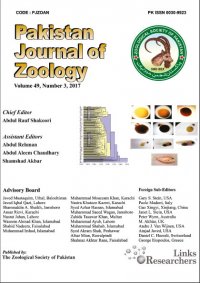Evaluation of Synthetic Insecticides and Essential Oils for the Management of Phyllocnistis citrella Stainton (Lepidoptera: Gracillariidae)
Evaluation of Synthetic Insecticides and Essential Oils for the Management of Phyllocnistis citrella Stainton (Lepidoptera: Gracillariidae)
Muhammad Arshad1, Muhammad Irfan Ullah1,*, Muhammad Afzal1, Yasir Iftikhar2, Samina Khalid3, Zahoor Hussain4, Jaime Molina-Ochoa5,6 and John E. Foster6
ABSTRACT
Citrus leafminer (CLM), Phyllocnistis citrella Stainton (Lepidoptera: Gracillariidae) is a destructive insect pest of citrus nurseries as well as orchards in Pakistan. The aim of this study was to assess the effectiveness of some synthetic insecticides and essential oils against citrus leafminer larvae. Two laboratory bioassays, leaf dip bioassay (LDB) and topical bioassay (TB) were developed to check the efficacy of tested chemicals and essential oils. As seen from results, abamectin showed significant mortality (63.5%) of CLM larvae when topical bioassay was performed. Similarly, the percent mortality of CLM larvae was 53.8% after application of abamectin, when leaf dip bioassay technique was used. However, among tested botanicals, Azadirachta indica oil showed better results with percent CLM mortality of 35.6%, through topical bioassay and 31.8% through leaf dip bioassay. In the case of A. indica, the LC50 value was also observed lower (1.88±0.37, 1.73±0.29) in LDB and TB, respectively, as compared to other botanicals. So, our study suggested that abamectin gave better management of citrus leafminer larvae. However, higher concentrations of A. indica oil can be used to control CLM larvae.
To share on other social networks, click on any share button. What are these?










